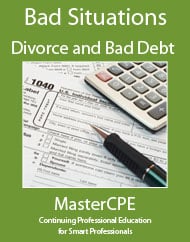Course Information
Bad Situations: Divorce, Bad Debt and Tax Implications
Course Information
| Title: | Bad Situations: Divorce, Bad Debt and Tax Implications |
|---|---|
| Category: | Taxation |
| Field of Study: | Taxes |
| Course Code: | M271 |
| CPE Credits: | 14.0 |
| Price: | 88.95 |
Description
Description:
This course covers tax implications of bad situations like divorce, bad debt, foreclosures, and more. It will teach participants how to apply, implement, and evaluate the strategic tax aspects of marital dissolutions and living together arrangements. Current perspectives on property transfers, asset divisions, alimony, filing status, exemptions, and child support are examined with an emphasis on planning considerations. The cancellation of indebtedness income inclusion rules are examined in the context of debt forgiveness and property foreclosure. Emphasis is given to the exceptions from income inclusion contained in Section 108. The tax treatment of property repossession under Section 1038 is explored with detail given to the calculation of gain and received property basis. Finally, bad debt treatment under Section 166 is reviewed and critical distinctions made between business and non-business debts.
Delivery Method: Online Interactive Self Study
Level: Overview
Prerequisites: None
Advanced Preparation: None
Course Details
Category: Taxation
Field of Study: Taxes
Passing Score: 70%
Technical Details: Taxation is a technical field of study for all states.
For More Detail:
If you are unable to view PDF then right click the mouse and click save link as
Objectives
Objectives:
Chapter 1: Basic Marital Tax Matters 1. Specify multiple tax implications to consider when going through a divorce, and recognize the requirements and effects of filing as married or unmarried. 2. Identify the requirements for filing a joint return and how to avoid being penalized. 3. Determine the key elements of filing separate returns including what items to report and identify whether or not married taxpayers should file separate returns. 4. Recall the requirements for filing as head of household and the tax ad-vantages and disadvantages of this filing status. 5. Recognize the repeal of personal exemptions, their pre-2018 phaseout, availability, and reporting requirements. 6. Identify the former regular and special method for determining support and complications from back child support, determine the current “qualified child” standard using residency, relationship, age, and joint re-turn prohibition, and recall the requirements that must be met for parents to treat a child as a qualifying child of a non-
For More Objectives:
If you are unable to view PDF then right click the mouse and click save link as
Profession
NASBA: Yes
QAS: Yes
CPA: Suitable for all CPAs
IRS: IRS credit for Enrolled Agents.
Profession Identifiers: CPA, EA

